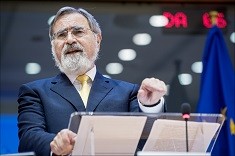Rabbi Lord Jonathan Sacks
Beloved friends. The news that I had won this prize almost rendered me speechless, an event that would have been unprecedented in the history of the rabbinate. But it has left me moved, humbled, thankful, and deeply motivated, because to me the award is not just about what has been done but also about how much there is still to do.

I want to express my deep sense of gratitude to and kinship with the Templeton family . . .
. . .I know full well that the credit is not mine, but that of the Jewish tradition to which I have tried to give voice, and to its twin imperatives: to be true to our faith and a blessing to others regardless of their faith. People sometimes ask me how I became a speaker, and I answer: Simple. I married the best listener in the world. So my thanks to Elaine, and to our children – Josh, Dina and Gila – and their wonderful families who gave me so much support, and to Joanna, Dan and Debby, my wonderful team. And thanks ultimately to God, who believes in us so much more than we believe in Him.
I said that to me the prize is less about recognition of the past than about responsibility for the future, and it is to that future I turn tonight. This is a fateful moment in history. Wherever we look, politically, religiously, economically, environmentally, there is insecurity and instability. It is not too much to say that the future of the West and the unique form of freedom it has pioneered for the past four centuries is altogether at risk. . . . continue reading